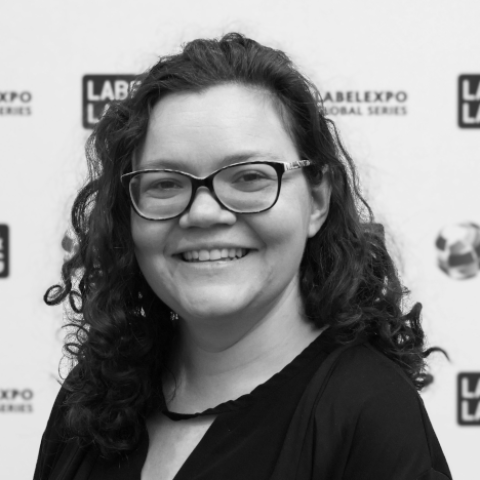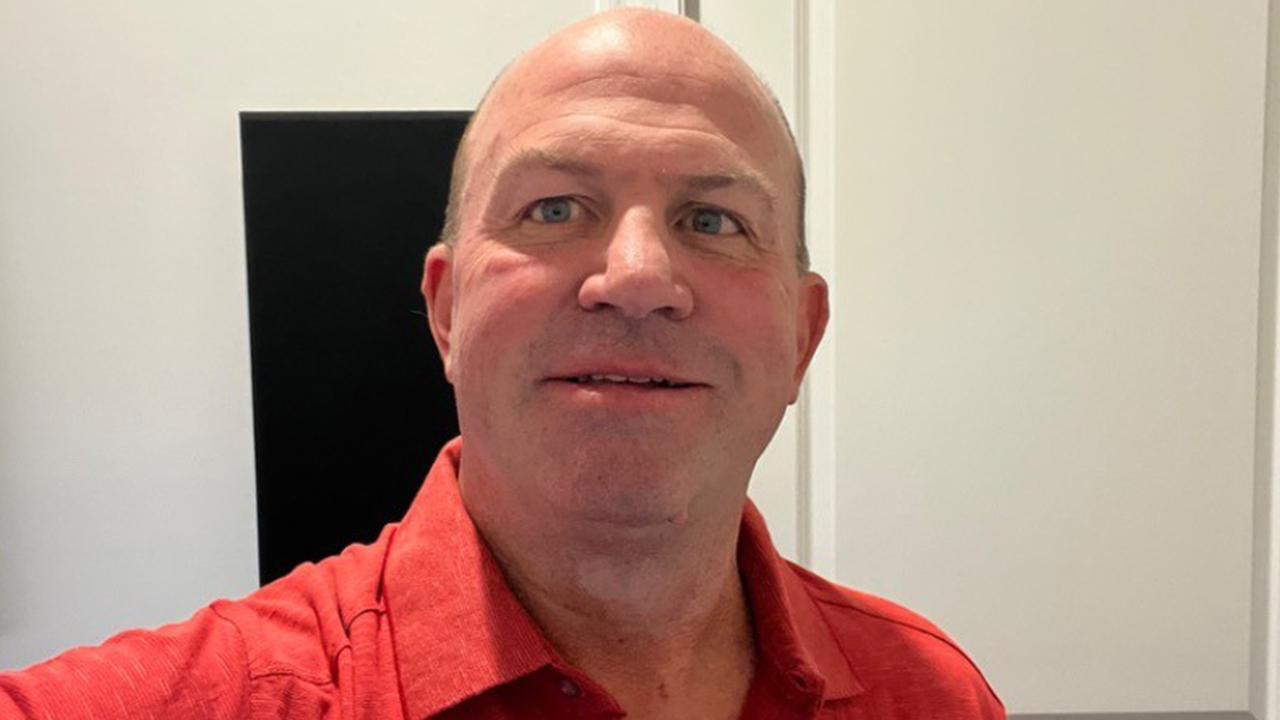TLMI Converter Meeting addresses uncertainty
Speakers at the TLMI Converter Meeting discussed tariffs, federal workforce layoffs and changing demographics.
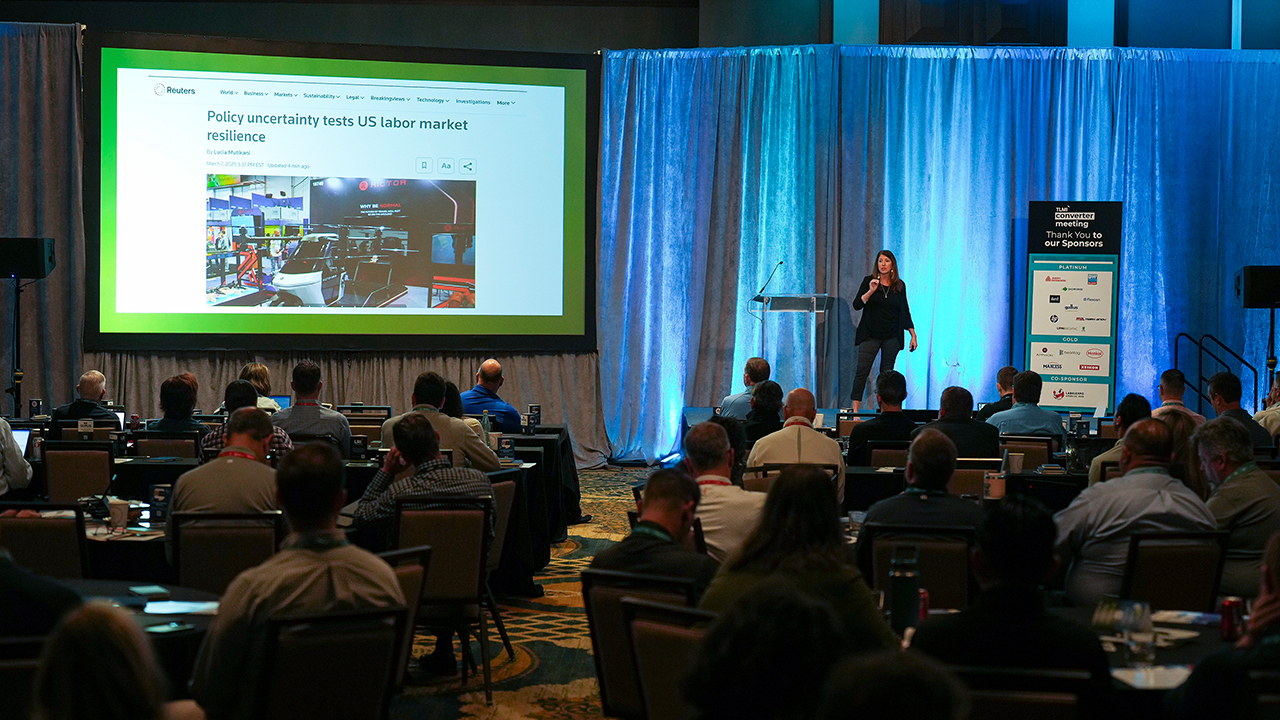
Claudia St John speaks to the audience at the TLMI Converter Meeting (Photo courtesy of TLMI)
During her talk on the second full day of the TLMI Converter
Meeting, Claudia St John of The Workplace Advisors had a question for the business leaders in the room.
‘How many of you are hiring in the same volume, with the same level of intensity, that you were in 2023?’ St John asked.
A few people throughout the room raised their hands.
‘Maybe five percent of you?’ St John said, looking around. ‘How many of you are looking to lay off?’
No one raised their hand.
The converter responses in the room exemplify the state of the economy right now, St John said. No one is hiring, and no one is firing. Business owners are in ‘wait-and-see’ mode, hesitant about tariffs, supply chains and more.
“Washington is, the best way to put it, in an unprecedented spot right now”
Economic uncertainty was a theme featured throughout several talks at the TLMI Converter Meeting, held at La Cantera Resort and Spa in San Antonio, Texas, from March 9 to 11. The meeting was open almost exclusively to converters, who networked, learned and heard from speakers on a wide range of topics, including the economy, RFID, sustainability and design trends.
Speakers
On the first full day, attendees heard from Alan Beaulieu of ITR Economics, who provided an economic forecast, and Cory Francer of Napco, who spoke about digital printing.
Converters also received information on the TLMI Management Ratio Study, a report comparing the performance of participating converters in the market.
Anne Johnson, principal and vice president of RRS (Resource Recycling Systems), kicked off the second day with an update on TLMI’s Liner Recycling Initiative. The initiative has identified a mill, Sustana, to recycle release liner, and now needs silicone-coated release liner generators to participate. Johnson asked for the converters’ help connecting with the release liner generators.
Afterward, TLMI’s Regulatory Affairs Committee chairs, Tyler
Matusevich of Brook + Whittle and Patrick Potter of Flexo Wash, spoke with Bryan Vickers of the lobbying firm Pace about tariffs, the reduction in the federal workforce, Congress’ tax bill and environmental regulations.
‘Washington is, the best way to put it, in an unprecedented spot right now,’ Vickers said.
Vickers started the conversation by depicting the current
situation in Washington, describing government agencies as unsure about the future due to DOGE’s work.
‘Everyone is getting, from the Department of Government
Efficiency, anecdotal information about contracts being cut,
employee positions being reduced, voluntary buyouts, and this is continuing for the time being into the future,’ he said.
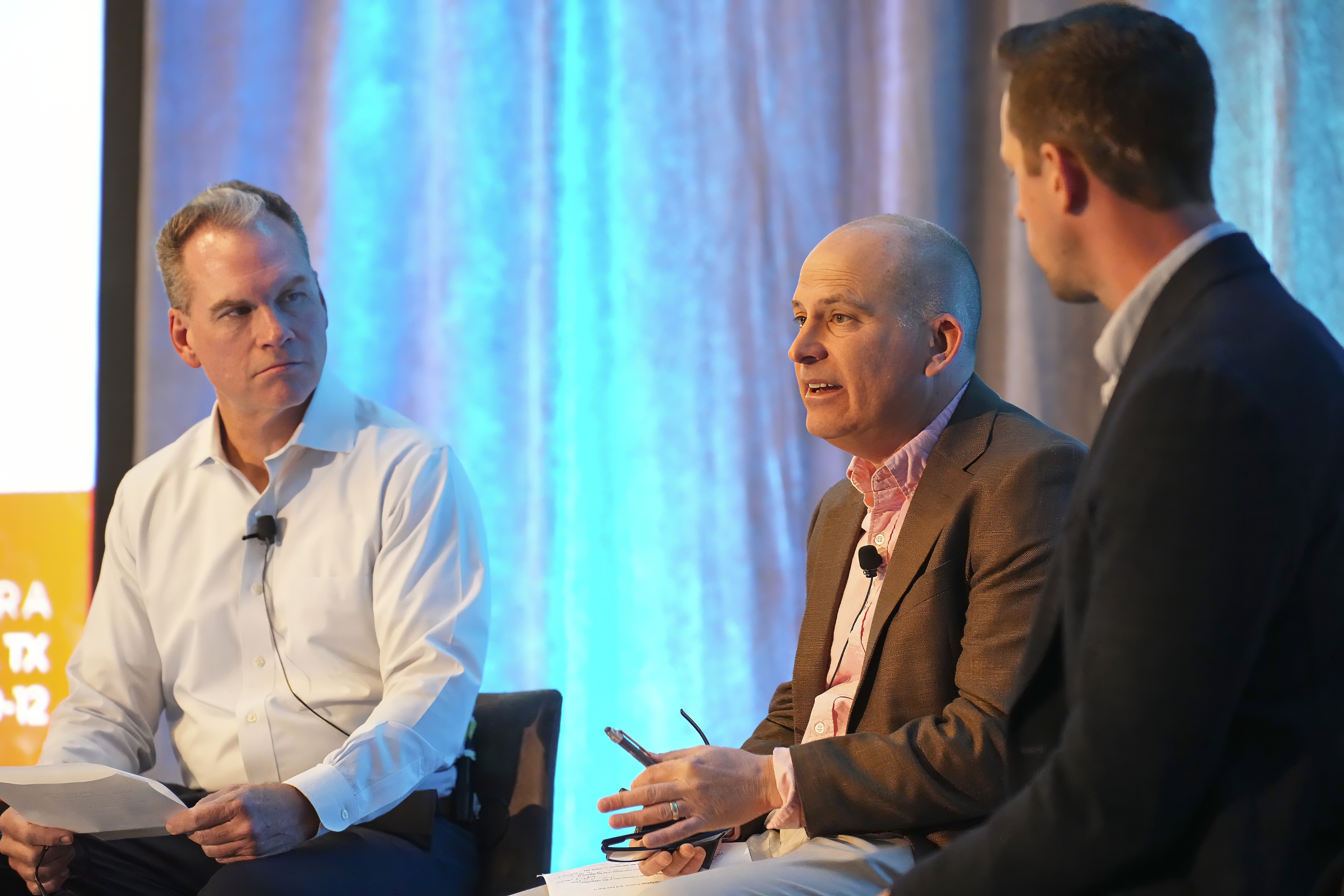
Subsequent speakers then veered to covering design for
recyclability, RFID and branding. Ruben Nance of the Association of Plastic Recyclers discussed guidelines for receiving Design for Recyclability recognition. Matthew Russell, managing director of retail at the Auburn University RFID Lab, provided an overview of RFID technology. St John spoke next on workforce trends. The final speaker of the day was Matt Tanaka of the Stout Collective, which
specializes in branding and design for breweries. Tanaka spoke about trends in branding.
The TLMI Converter Meeting ended with an award ceremony, where converters received Eugene Singer awards recognizing business management practices based on their results in the Management Ratio Study. The results are based on 11 factors and metrics, providing a complete picture of the participating companies’ financial standing.
There was one winner from each of the four size categories.
CleanMark in Portland, Oregon, won in the small company
category. Graphicsland in Tinley Park, Illinois, received the award for the mid-range company category. KDV Label in Waukesha, Wisconsin, won in the medium-sized company category. Inovar Packaging Group in Dallas, Texas, received the Eugene Singer award in the large company category.
Alan Beaulieu’s final lap
Beaulieu’s talk at this year’s Converter Meeting was the 18th time he has spoken at a TLMI event, making him the longest-running speaker in the association’s history. This Converter Meeting was also Beaulieu’s last time speaking at TLMI, as he would retire shortly after. Converters were eager to hear from him one final time.
Beaulieu said the economic forecast for 2025 looks positive.
However, beyond that, Beaulieu predicted a coming Great
Depression in the 2030s, caused by factors such as an aging population, US national debt and increasing health care costs.
“You just have to make sure you’re planning on infl ation and higher interest rates and higher labor rates”
Beaulieu also addressed tariffs. Speaking about three weeks
before the Trump administration's 'Liberation Day' tariffs on goods from almost every country in the world, Beaulieu said that tariffs can be good for some industries and bad for others. They can also cause inflation, which then leads to higher interest rates. High enough interest rates can bring about a recession, which could then, with the right timing, accelerate the depression. However, Beaulieu said high inflation would likely be the worst outcome of the tariffs.
Beaulieu also spoke about DOGE’s work reducing the federal workforce. He said the federal workforce does need to be reduced, but that DOGE’s work is causing confusion and chaos. Not enough chaos to cause a recession, but enough to cause an economic slowdown. He also said that reducing the federal government will not prevent the coming Great Depression in the 2030s.
Beaulieu said inflation will rise in the coming years for various reasons, including increased electricity and labor costs. He said labor costs are expected to grow 28 percent by the end of the decade. Along with inflation, interest rates will also increase.
Over the next few years, Beaulieu noted, the US GDP
will continue to grow, and industrial production, primarily
manufacturing, will increase. High-tech industries are expected to be especially lucrative. Real income, meaning income adjusted for inflation, will go up.
‘As far as I can tell, you’re going to like the second half of the
year. You’re going to like ‘26, ‘27, onto the rest of the decade,’ he said. ‘You just have to make sure you’re planning on inflation and higher interest rates and higher labor rates.’
Beaulieu recommended prioritizing efficiency to deal with these challenges and going beyond AI and automation to do so.
To prepare for the 2030 Great Depression, Beaulieu suggested speaking to wealth advisers about protecting investments from inflation. He advised adopting a wealth preservation strategy in the early years of the 2030s and then switching to an aggressive strategy and making investments around 2035.
‘My wish for all of us in this room is that we will not fear the
depression,’ he said. ‘We will prepare successfully for it.’
Workforce changes
In her talk, St John said the job market is strong, and that the current economic uncertainty is caused by policy.
Similar to Beaulieu, she discussed the impact of the aging US population. In 2040, she said, just 15 years from now, there will be more deaths than births in the US. Combined with declining immigration, the coming years will see a tightening labor market, she said.
She also said that deportations would likely include millions
of people who are currently working in the US. Employers, she advised, should expect increased enforcement, and they should prepare by ensuring their I-9s on file are filled out correctly, as mistakes in I-9s lead to fines.
The current, frozen labor market is a great opportunity to hire talent, St John said. In a few years, Baby Boomers will leave the workforce, creating more competition for talent.
Now is also a good time to upskill staff, she said.
‘Your workforce should be a priority because this isn’t going
away,’ she said on the tightening labor market.
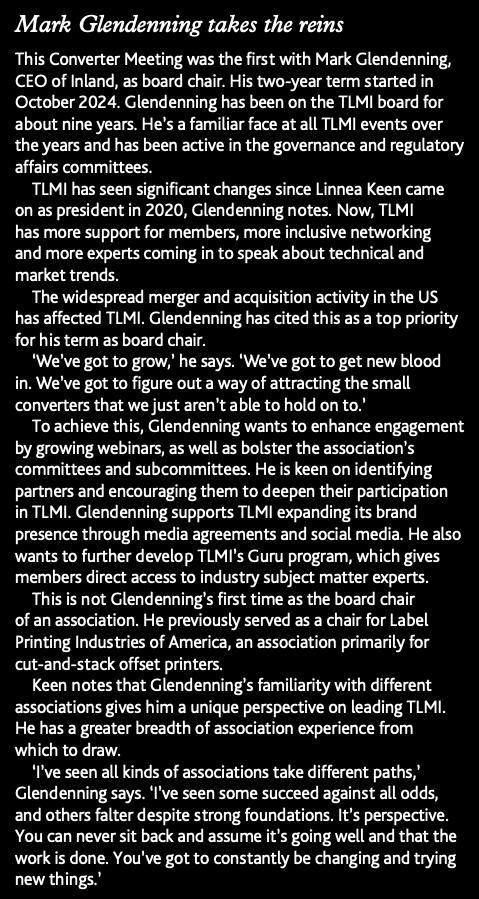
Stay up to date
Subscribe to the free Label News newsletter and receive the latest content every week. We'll never share your email address.
